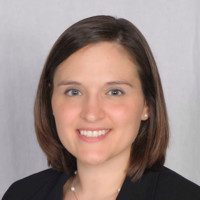‘It’s An Amazing Time To Be A Radiation Oncologist’


Targeting Cancer is raising awareness of radiation oncology in Australia and New Zealand, but what is life like for radiation oncologists in other areas of the world?
More than 1.2m cancer patients in the USA are expected to receive radiation therapy this year as part of their initial treatment. As oncology treatment advances, radiation oncologists continue to play a critical role in curative treatment for many types of cancer and provide symptom relief for those who are suffering with metastatic disease.
Trainee radiation oncologist Adrianna Masters is in her final year of residency at Wake Forest University in North Carolina and a member of the Society for Women in Radiation Oncology (SWRO), which promotes women in radiation oncology.
Targeting Cancer caught up with Adrianna to discover more about the current state of play of American radiation oncology, her work with SWRO and how a love of looking after cancer patients motivates her and continues to shape her career.
Why did you decide to pursue a career in radiation oncology? Was there any family background or a moment in your life that made you want to follow this path?
I knew when I started the MD/PhD program that I wanted to pursue a career in oncology. When I started I had thought more about pediatric hematology and oncology but after experiencing cancer from a family perspective during my father’s treatment for rectal cancer, it changed my mind. I saw all the different types of cancer specialties and I realized how different radiation oncology is as a specialty. The weekly treatment visits help to build a bond between physician, patient, and family in a difficult time for them. It is also a very interesting intersection between science, technology and patient care.
Please could you outline your training/studies? Where are you based now? How long have you been there?
After high school, I attended Wake Forest University and completed a BS chemistry and a minor in biology. Then I completed the MD/PhD Program at the University of Louisville with a PhD concentration in biochemistry and molecular biology. My first year of residency was a preliminary year in Internal Medicine at the University of Louisville, and I am currently in my fourth and final year at Wake Forest for Radiation Oncology residency.
Describe a typical working day for you?
It varies a lot based on the rotation. Residents here do rotations with different physicians every three months. Typically we work with one or two attending physicians each rotation in an apprentice style schedule – whatever patients our attending(s) have on their schedule, the residents will also see. Usually the first hour is either a residency education lecture or chart rounds, where we review patient treatment plans. We also do radiation biology (two of the four years) and physics (yearly for 4 years) for 1-4 hours each week. On treatment visit (OTV) days we see all the patients that are undergoing treatment on our service, check on their symptoms, review their plans, and answer questions. Each patient is seen at least once per week. OTV day here will also typically be the planning visit day where we set up patients in the position we will treat them in and do a CT scan to map out their individualized treatment plans. Most days also have new patient consults and follow up visits. It’s a lot of variety, which I like.
Almost every day has some component of planning, either marking out what you want to treat, reviewing with dosimetry and physics how the computer/machine will deliver the plans, or verifying that the set-up of the patient on the machine with the therapists accurately represents the intention of the plan. You get to work with all different aspects of the planning and delivery that involves a very large team of people. Coordinating care is something I really enjoy.
Outside of the radiation oncology department, we also discuss patients in multidisciplinary tumour boards where all the different types of providers that care for cancer patients discuss patient cases a few times a week.
Once clinic is done and patients are cared for, I typically study and/or work on some research projects that interest me most evenings.
What do you enjoy most about this job?
I love taking care of patients. I enjoy counselling about their treatment options and providing comfort and peace during a very scary time of their lives.
What are knowledge levels/patient awareness of radiation therapy where you are based and among patients generally?
We have a huge variation in terms of patient education and health literacy. Our referral area includes both the university and the employees of the medical centre as well as a very large surrounding area. This surrounding area includes patients from rural and urban areas that may have little exposure to medical care in general and are trying to navigate through the healthcare system while managing a new diagnosis of cancer.
Most patients have never had radiation before and many come to us already terrified of it. Some have had loved ones that were treated decades ago that had far worse side effects than we’d expect with today’s technology or are worried that they will be radioactive and can’t see their grandchildren (as a few examples). There are many common misconceptions about the delivery and side effects of radiation. I always let patients know that they can ask any questions and I give a very general overview of what radiation is and how it works during our first visit. I think it’s important to realize that each person comes with a different perspective and will need a slightly different discussion.
Is enough done in your country to promote radiation therapy? What more could be done?
ASTRO (American Society of Therapeutic Radiation Oncology) has several patient videos and brochures that help explain some of what to expect with radiation. There is also a Powerpoint designed to talk to GPs about radiation. I think they are quite helpful, but there are still a lot of misconceptions. Radiation has so many applications and curative options! The way that we approach cancer overtime changes. If I could communicate one idea – I would say that radiation therapy is a carefully constructed process most commonly with curative intent!
What are the knowledge levels among GPs there re: radiation therapy? Do they know enough about it?
I think it’s a lot to ask of our very hard-working GPs to know an extensive amount about a fairly small specialty. I think it is great for them to know when their patients have radiation and to know to ask if they have questions. A lot of the skin reactions from radiation are very self-limited but look concerning if you are not used to seeing them. When in doubt – just ask!
I also try to encourage my patients to follow up with their GP after their radiation and their one-month post-op visit to update their GP on what’s happening in their cancer care.
Tell us about SWRO – what are its aims and why was it set up?
The Society for Women in Radiation Oncology (SWRO) was established to provide a platform to promote women in the field of radiation oncology. We aim to provide networking and mentoring opportunities for women focusing on career development and the steep transition into leadership roles in our field. We recognize that many women lack strong female role models in their training or work environment and SWRO was established to fill this gap. SWRO will provide a forum to support trainees and faculty who are working to build connections with established women in radiation oncology through sponsorship at all levels. We are a group of women and men dedicated to championing gender equality in oncology, acknowledging the specific challenges of women, and removing barriers to the advancement of women in professional and academic settings.
Radiation oncology is one of the few specialties in which the proportion of women residents actually decreased from 2005 to 2015. Despite women comprising approximately 50% of medical students nationwide, only 25-30% of current radiation oncology residents are female. We at SWRO want to do our part to 1) celebrate the amazing female radiation oncologists; 2) increase awareness of radiation oncology alongside other oncologic specialties; and 3) increase awareness of radiation oncology as a fantastic specialty among female medical students.
What inspired you to be involved in SWRO?
I have always been a proponent of diversity in the workforce. The founders of SWRO really wanted to provide a sounding board for promotion of women in radiation oncology at a time that the numbers of female residents were dwindling. Many residents were at programs where they were the only female physician (resident, attending MD, or physicist) which makes it hard to know who to approach if you have questions or concerns. There are some specific things that you can’t do as a pregnant radiation oncologist – for example brachytherapy procedures (you can leave that part out if you like).
Also, I wanted to be involved in encouraging more women to go into the field, starting with increasing exposure of female medical students to the specialty.
Tell us about your work with SWRO? What does it involve?
I started and maintain the Twitter account for SWRO @S_W_R_O and tweet/re-tweet topics in oncology, radiation oncology, women in medicine, women in science, women in leadership topics.
It has been great working with the wonderful women of SWRO on this social media campaign (my apologies should I leave anyone out): Ashley Albert, Courtney Hentz, Chelain Goodman, Sumi Sinha, Emily Daugherty, Shraddha Dalwadi, Winnie Wong, Hina Saeed, Stephanie Rice, Jessica Schuster, Anna Lee, Lindsay Puckett, Laura Dover, Lillie O’Steen, Chaudhry Human, Parul Barry, Virginia Osborn, Genevieve Maquilan, Lillie O’Steen, Stephanie Yoon and Reshma Jagsi.
Are there any advantages to being a women involved in radiation oncology? Any situations where it is an advantage or disadvantage?
I think there are some patients that may feel more comfortable in specific vulnerable situations with a female physician. Each of us bring a different perspective and viewpoint to patient interactions and representing our patient population in our workforce allows a safe place for everyone to feel welcome and appreciated. There are some situations that perception of female physicians can make it more difficult to accomplish care efficiently, but numerous studies across multiple medical specialties have correlated female physicians with increases in patients feeling that their concerns are heard and their needs are meet. Some studies have even shown improvements in quality metrics of care with female versus male physicians. This is in no way meant to say our male colleagues are not doing an excellent job, but that an environment that is not enriched in female physicians is missing a valuable component of patient care. I often find myself being the person in a room during a difficult situation that can best appreciate the other person’s perspective and allow for more efficient conflict resolution. Often it is not an intentionally negative scenario, but a miscommunication.
What advice would you give to young female trainees studying or about to enter the rad onc world?
Yes you can! You can do it!
If you feel passionately about something, do not let anyone tell you that you can’t do it. Do not allow yourself or others to underestimate you and what you bring to the table as a female radiation oncologist. Your patients entrust with you a very special gift of being able to be their oncologist and leader through a difficult time. Plus – how cool is it to use gamma rays and photons to cure cancer? It is truly an amazing time to be a radiation oncologist.
For you, what do you love most about your job and why would you recommend it to others as a career?
Radiation oncology is a wonderful field. I get to take care of cancer patients, which is incredibly rewarding. I love the variety of discussing cases, individualizing a treatment plan, counselling patients, and working in large teams to provide excellent care.
I use literature and evidence-based medicine to make treatment decisions with a backbone of basic science fundamentals in physics and radiation biology. Every day is a little different and I couldn’t see myself doing anything else.




